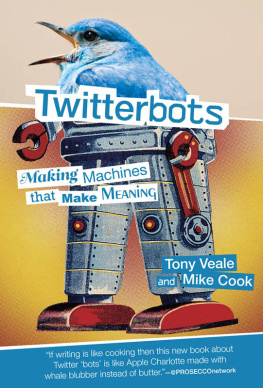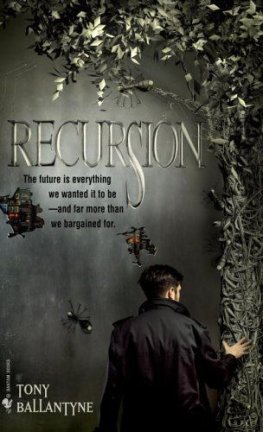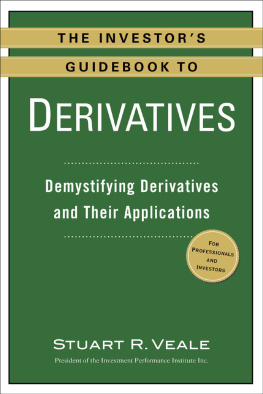Tony Veale - Twitterbots: Making Machines that Make Meaning (The MIT Press)
Here you can read online Tony Veale - Twitterbots: Making Machines that Make Meaning (The MIT Press) full text of the book (entire story) in english for free. Download pdf and epub, get meaning, cover and reviews about this ebook. year: 2018, publisher: The MIT Press, genre: Romance novel. Description of the work, (preface) as well as reviews are available. Best literature library LitArk.com created for fans of good reading and offers a wide selection of genres:
Romance novel
Science fiction
Adventure
Detective
Science
History
Home and family
Prose
Art
Politics
Computer
Non-fiction
Religion
Business
Children
Humor
Choose a favorite category and find really read worthwhile books. Enjoy immersion in the world of imagination, feel the emotions of the characters or learn something new for yourself, make an fascinating discovery.

- Book:Twitterbots: Making Machines that Make Meaning (The MIT Press)
- Author:
- Publisher:The MIT Press
- Genre:
- Year:2018
- Rating:5 / 5
- Favourites:Add to favourites
- Your mark:
- 100
- 1
- 2
- 3
- 4
- 5
Twitterbots: Making Machines that Make Meaning (The MIT Press): summary, description and annotation
We offer to read an annotation, description, summary or preface (depends on what the author of the book "Twitterbots: Making Machines that Make Meaning (The MIT Press)" wrote himself). If you haven't found the necessary information about the book — write in the comments, we will try to find it.
Twitterbots: Making Machines that Make Meaning (The MIT Press) — read online for free the complete book (whole text) full work
Below is the text of the book, divided by pages. System saving the place of the last page read, allows you to conveniently read the book "Twitterbots: Making Machines that Make Meaning (The MIT Press)" online for free, without having to search again every time where you left off. Put a bookmark, and you can go to the page where you finished reading at any time.
Font size:
Interval:
Bookmark:
Tony Veale and Mike Cook
The MIT Press
Cambridge, Massachusetts
London, England
2018 Massachusetts Institute of Technology
All rights reserved. No part of this book may be reproduced in any form by any electronic or mechanical means (including photocopying, recording, or information storage and retrieval) without permission in writing from the publisher.
This book was set in ITC Stone Serif Std by Toppan Best-set Premedia Limited. Printed and bound in the United States of America.
Library of Congress Cataloging-in-Publication Data
Names: Veale, Tony, 1967- author. | Cook, Mike, author.
Title: Twitterbots : making machines that make meaning / Tony Veale and Mike
Cook.
Description: Cambridge, MA : The MIT Press, [2018] | Includes bibliographical
references and index.
Identifiers: LCCN 2017050462 | ISBN 9780262037907 (hardcover : alk. paper)
eISBN 9780262346429
Subjects: LCSH: Twitter. | Twitterbots. | Natural language generation
(Computer science)
Classification: LCC HM743.T95 V43 2018 | DDC 006.3/5--dc23 LC record available at https://lccn.loc.gov/2017050462
ePub Version 1.0
In an age when people still sent telegrams and paid for their messages by the word, the telephone companieswhich were not to be outdone by an older technologywould proudly proclaim, Every telephone is a telegraph office. Much like todays mobile phones, this combination of technologies made the world a smaller and more connected place, allowing people to do many of the same things that web-savvy users go online to do today, such as transferring money, booking tickets for passage by rail or sea, and ordering flowers, candy, books, and cigars for delivery to recipients in cities across the globe. In the late nineteenth and early twentieth centuries, when the world was connected not by the Internet or the web but by transatlantic cable, and the last mile was just a boy on a bicycle, how-to books such as Nelson Rosss How to Write Telegrams Properly, a 1928 pamphlet, would joke that brevity is the soul of telegraphy. Though it is often said that it costs nothing to be polite, the telegraph was a communication medium whose users had to pay to say please and pay twice as much again to say thank you. If the telegraph was the Internet of its day, the telegram was its tweet.
We tend to use words sparingly when we have to buy them retail. Yet while constraints often bring out the best in us, telegraphy was not widely considered a medium in which writers did their best work. Even James Joyce, one of the most creative writers of the twentieth century, could only muster the three-word missive son born Jim to his brother Stanislaus on the birth of his son Giorgio.
Telegrams were much faster than letters, of course, but they discouraged verbosity and encouraged instead a system of conventions, shorthands, and codes. However, even conventions are open to playful exploitation. When physicist Edward Teller, not a man celebrated for his linguistic creativity, telegraphed colleagues to notify them of the first successful detonation of a hydrogen bomb, his telegram was not unlike Joyces: Its a Boy.
When General Charles Napier conquered the Indian province of Sindh (now part of Pakistan) in 1843 on behalf of his employers in the East India Company, he is said to have cheekily sent them the one-word telegram, Peccavi. Napier was a veteran of the Peninsular War, whose mandate in Sindh was to suppress the rebellious elements who were making commerce difficult for his employers, and he brought with him the public school philosophy that one is never more predisposed to gratitude than after receiving a sound thrashing. But Napier exceeded his mandate by brutally bringing the whole province to heel, and though he was richly rewarded for his efforts, his military zeal was the target of much criticism in the newspapers and in parliament. So Peccavi, Latin for I have sinned, was both a confession of his guilt and a celebration of his military victoryin other words, I may have sinned but I have Sindh. It didnt hurt that Napier could show off his classical education in the process and flatter his employers too by acknowledging that they were also educated enough to understand Latin.
Napiers witticism rings true mainly because we want it to be true. It caps a witty anecdote that hides the horrors of imperial repression behind a clever pun. Like the many instances of verbal ineptitude that folk history attaches to Vice President Dan Quaylesuch as the tale of how, on a tour of Latin America, Quayle expressed regret at not having taken Latin classes in high schoolwe prefer the humorous legend to the boring truth. But just as Quayles tale of Latin witlessness was invented by a late-night comic and later misremembered and misquoted as historical fact by a willing electorate, Napiers tale of Latin wit was invented by a schoolgirl, Catherine Winkworth, who joked to her teacher that Peccavi would have been the wittiest way for the overzealous general to signal his triumph to his disapproving bosses. Winkworth sent her joke to the editors of a new humor magazine, Punch, and Peccavi soon became part of the official Napier biography.
If Napiers telegram that never was seems like a lost opportunity to impress future historians, future generals were more than ready to make up for Napiers oversight. In 1856, when the British annexed the Indian province of Oudh (whose name rhymes with loud), the governor-general of India, Lord Dalhousie, sent a one-word telegram, Vovi, to the Foreign Office in London. Taking his cue from the schoolgirl of the decade before, Dalhousies Vovi is Latin for I have vowed, and can thus be read as a pun for I have Oudh [as I vowed]. But the governors annexation of Oudh was to stir rebellious feelings among the ill-treated population, forcing General Colin Campbell (later Baron Clyde) to take and later retake the city of Lucknow following the Sepoy mutiny of 1857. After capturing Lucknow for the second time in 1858, Campbell is said to have sent yet another Latin joke by telegraph. But inflation was clearly taking its toll, for Campbell now needed three wordsNunc fortunatus sum, meaning I am in luck nowto signal his victory with a pun. In military circles, the Latin pun was fast becoming a telegraphic meme with which generals could simultaneously paint a veneer of polite society over the brutality of imperialism and cement their reputations in the history books.
We can see why puns such as Peccavi and its later variants might have appealed to a clever child such as Catherine Winkworth. Like most other instances of creativity, linguistic or otherwise, Winkworths pun made the strange seem more familiar and the familiar seem just a little stranger and more exotic. New ways of referring to the distant corners of the British Empire could be fashioned from the stuff of everyday schoolwork, while the banal substance of this workboring Latincould be put to new and clever uses. But what could drive such men of state as Dalhousie, and such men of war as Napier and Campbell, to quite literally speak (if only in our collective imaginations) like a schoolgirl, albeit one with a classical education and a dry wit? Aristotle said it best when he defined humor as a form of educated insolence, for linguistic creativity is an essentially precocious aspect of the way we use language. Its precocity is anchored in a number of seemingly contradictory desires: the desire to fit in, balanced with the desire to show off; the desire to respect tradition while demonstrating a mastery over convention; the desire to belong while striving to stand out; and the desire to follow (or be seen to follow) in the footsteps of past masters while blazing a trail of ones own. Having expended blood, treasure, and goodwill to secure a brutal victory, it may indeed seem juvenile for great men to exult in childish wordplay, but these puns offer the perfect symbol of what (we
Font size:
Interval:
Bookmark:
Similar books «Twitterbots: Making Machines that Make Meaning (The MIT Press)»
Look at similar books to Twitterbots: Making Machines that Make Meaning (The MIT Press). We have selected literature similar in name and meaning in the hope of providing readers with more options to find new, interesting, not yet read works.
Discussion, reviews of the book Twitterbots: Making Machines that Make Meaning (The MIT Press) and just readers' own opinions. Leave your comments, write what you think about the work, its meaning or the main characters. Specify what exactly you liked and what you didn't like, and why you think so.










